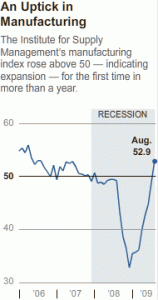Wisconsin Featured in NYT as Indicator of Economic Recovery
 From Saturday’s New York Times, Peter Goodman’s “In Wisconsin, Hopeful Signs for Factories.”
From Saturday’s New York Times, Peter Goodman’s “In Wisconsin, Hopeful Signs for Factories.”
A taste:
At the Rockwell Automation factory [in Mequon], something encouraging happened recently that might be a portent of national economic recovery: managers reinstated a shift, hiring a dozen workers.
After months of layoffs, diminished production and anxiety about the depths of the Great Recession, the company — a bellwether because most of its customers are manufacturers themselves — saw enough new orders to justify adding people.
Given the panicked retreat that has characterized life on the American factory floor for many months, any expansion registers as a hopeful sign for the economy. Last week, the Federal Reserve found signs of “modest improvement” in manufacturing. That reinforced the direction of a widely watched manufacturing index tracked by the Institute for Supply Management, which surged into positive territory last month for the first time in a year and a half.
But for sure: we aren’t quite there yet. The article goes on to warn that, “these indications, while welcome, promise no vigorous expansion: For now, factory overseers remain uncertain that a lasting resurgence is at hand, making them reluctant to hire workers aggressively and invest in new equipment.” That type of expansion might be some time off.
But here’s hoping that we are at least heading up from the bottom of the Great Recession.
PS
